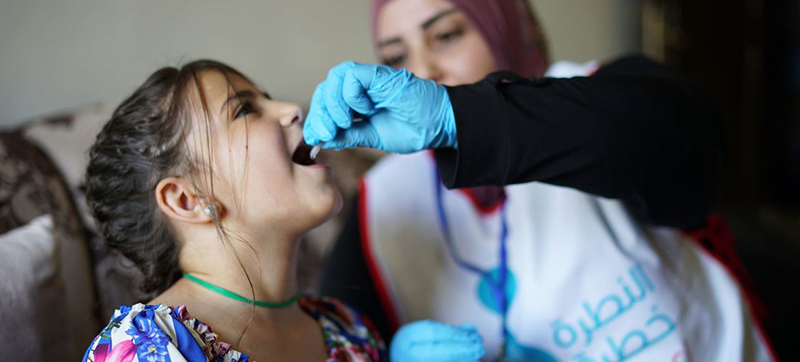 COVID19
COVID19 New York: Nearly 40 million children are at risk of getting measles due to the COVID-19 pandemic, the World Health Organization (WHO) and the United States Centers for Disease Control and Prevention (CDC) said in a joint report published on Wednesday.
Pandemic-related disruptions caused 25 million boys and girls to miss their first dose of the measles vaccine last year, while another 14.7 million did not get the second dose.
The record decline in measles vaccination coverage represents a significant setback in global progress to combat the disease.
Pandemic paradox
“The paradox of the pandemic is that while vaccines against COVID-19 were developed in record time and deployed in the largest vaccination campaign in history, routine immunization programmes were badly disrupted, and millions of kids missed out on life-saving vaccinations against deadly diseases like measles,” said Tedros Adhanom Ghebreyesus, the WHO Director-General.
“Getting immunization programmes back on track is absolutely critical. Behind every statistic in this report is a child at risk of a preventable disease,” he added.
Globally, there were an estimated nine million cases of measles in 2021, and 128,000 deaths.
Twenty-two countries experienced large and disruptive outbreaks, some of which have continued into this year.
Imminent threat everywhere
Declines in vaccine coverage, weakened measles surveillance, as well as continued interruptions and delays in immunization due to the pandemic, have made measles an imminent threat to every region of the world.
The situation is grave, the report said, as measles is one of the most contagious human viruses, though it is almost entirely preventable through vaccination.
Coverage of 95 per cent or greater of two vaccine doses is needed to create herd immunity that will protect communities.
However, global coverage rates are at their lowest levels since 2008, though they vary by country.
Currently, only 81 per cent of children are receiving their first measles-containing vaccine dose, and 71 per cent are getting their second dose.
Identify at-risk communities
The report warned that measles anywhere is a threat everywhere, as the virus can quickly spread throughout communities and across borders.
Furthermore, none of WHO’s six regions worldwide has achieved and sustained measles elimination.
“The record number of children under-immunized and susceptible to measles shows the profound damage immunization systems have sustained during the COVID-19 pandemic,” said Dr Rochelle P. Walensky, the CDC Director.
“Measles outbreaks illustrate weaknesses in immunization programmes, but public health officials can use outbreak response to identify communities at risk, understand causes of under-vaccination, and help deliver locally tailored solutions to ensure vaccinations are available to all.”
Action and investment
The report urged public health officials to accelerate and strengthen vaccination efforts now.
Coordinated action by all partners, and at all levels – global, regional, national and local – is needed to prioritize efforts towards finding and immunizing all unprotected children.
Investment in robust surveillance systems is also required to mitigate the risk of outbreaks.
Support Our Journalism
We cannot do without you.. your contribution supports unbiased journalism
IBNS is not driven by any ism- not wokeism, not racism, not skewed secularism, not hyper right-wing or left liberal ideals, nor by any hardline religious beliefs or hyper nationalism. We want to serve you good old objective news, as they are. We do not judge or preach. We let people decide for themselves. We only try to present factual and well-sourced news.







